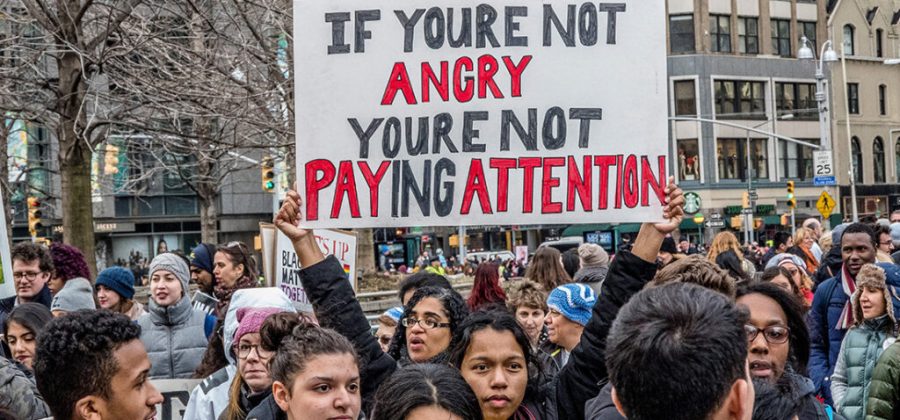WADING INTO DANGEROUS TERRITORY
In the years since its landmark decision, Roe v. Wade has garnered its own connotations. Originally, the case was between Jane Roe (whose real name was Norma McCorvey) and Texas (represented by the District Attorney of Dallas county, Henry Wade). Roe filed a lawsuit against Wade to challenge the criminalization of abortion in Texas, where policy at the time made abortion illegal unless ordered by a doctor. Roe built her case on the grounds that the laws restricted her personal privacy, which was protected by the First (freedom of religion, assembly, expression etc.), Fourth (preventing unreasonable searches/seizures by the government), Fifth (not being forced to testify against yourself), Ninth (rights given to the people are not only contained to the constitution), and Fourteenth (granting citizenship to African Americans, and illegalizing the taking of citizenship unless someone gives it up freely) amendments.
“We acknowledge our awareness of the sensitive and emotional nature of the abortion controversy; of the vigorous opposing views, even among physicians. …” Justice Harry A. Blackman, representing the majority (7-2) opinion, said. “The right of personal privacy includes the abortion decision, but this right is not unqualified and must be considered against important state interests in regulation.”
With this decision, it was decided that abortion would be legal up until the fetus was viable outside of the womb, at around 24 weeks of pregnancy. Recent laws enacted in states like Florida, Kentucky, and Mississippi, have all moved to restrict abortion in some way. Texas is one of the most severe, preventing abortion after cardiac fetal activitity, which tends to occur at six weeks. For reference, most women find out their pregnant between 4-7 weeks, but a study done by Advancing New Standards in Reproductive Health (ANSIRH) found that 1:3 people discover their pregnancy after six weeks, decreasing their chance to get an abortion.
“People of color, people living with food insecurity, people with unplanned pregnancies, and those who rely on clinic-based testing to confirm a pregnancy are also more likely to discover pregnancy past seven weeks’ gestation,” ANSIRH reported.
These state laws have only been emboldened with the recent Supreme Court leak, revealing a draft that showed Roe v. Wade may be overturned. Politico, the news organization that received the leak first, shared that, if this first draft was ultimately adopted, it would closely align with Mississippi’s state law of banning abortion after 15 weeks.
“Roe was egregiously wrong from the start. Its reasoning was exceptionally weak, and the decision has had damaging consequences,” Justice Samuel Alito said in his draft of the majority opinion. “And far from bringing about a national settlement of the abortion issue, Roe and Casey have enflamed debate and deepened division.”
The ‘Casey’ that Alito cites in his statement refers to the 1992 Supreme Court case “Planned Parenthood of Southeastern Pennsylvania v. Casey” in which Governor Robert Casey of Pennsylvania attempted to add more regulations to abortion within the state. Amongst his propositions were getting informed consent from the patient, instituting a 24 hour wait period, requiring minors to get consent from a parent, and having married women notify their husbands before getting an abortion. Restating the right to privacy, the Supreme Court did not uphold Casey’s attempted additions to abortion law.
“It must be stated at the outset and with clarity that Roe’s essential holding, the holding we reaffirm, has three parts.” The majority on Casey said. “First is a recognition of the right of the woman to choose to have an abortion before viability and to obtain it without undue interference from the State. Before viability, the State’s interests are not strong enough to support a prohibition of abortion or the imposition of a substantial obstacle to the woman’s effective right to elect the procedure. Second is a confirmation of the State’s power to restrict abortions after fetal viability, if the law contains exceptions for pregnancies which endanger the woman’s life or health. And third is the principle that the State has legitimate interests from the outset of the pregnancy in protecting the health of the woman and the life of the fetus that may become a child.”
The real fear now is that, if Roe vs Wade overturns, the precedent of privacy used to legalize abortion will be broken, leading to the loss of other rights protected by privacy. ‘Right-to-privacy’ laws that came after Roe v. Wade include Lawrence v. Texas (sexual privacy at home), Obergefell v. Hodges (same-sex marriage); ‘right-to-privacy’ precedents prior to Roe v. Wade include Griswold v. Connecticut (married couples right to contraception) and Loving v. Virginia (removed bans to interracial marriage). Technically, there is no amendment in the constitution that gives the right to privacy, but it is considered by many to be a ‘natural right’ or a right given to people simply by virtue of being human. However, health care is also considered a natural right.
The constitution of the World Health Organization states: “The enjoyment of the highest attainable standard of health is one of the fundamental rights of every human being without distinction of race, religion, political belief, economic or social condition.”
The irrefutable facts of the situation is that abortion is a part of healthcare, as is contraception. If an abortion cannot be afforded, the pregnant person often falls into greater poverty, harming not only their health, but the health of their children, and the health of the children they may have in the future, Healthlaw.org shares. Amnesty.org only solidifies this claim.
“Human rights law clearly spells out that decisions about your body are yours alone – this is what is known as bodily autonomy,” Amnesty.org said. “Forcing someone to carry on an unwanted pregnancy, or forcing them to seek out an unsafe abortion, is a violation of their human rights, including the rights to privacy and bodily autonomy.”
Loss of right to privacy and autonomy goes hand in hand with the criminalization of miscarriage. Firstly, it is important to note that abortion is technically labeled ‘miscarriage’- it just ‘induced miscarriage’. However, when miscarriage becomes prosecutible, all kinds of miscarriage fall under the umbrella. Thus, not only is abortion made a felony, but spontaneous abortion (non-induced) is also criminalized. The Regulatory Review shares that 38 states have ‘fetal homicide’ laws which separate crimes committed against a pregnant person to crimes committed against a fetus. Most of these laws end up regulating the actions and behaviors of the pregnant person to a higher degree than the rest of the population.
“Fetal personhood is also used against pregnant people who decline medical advice. Typically, patients have the right to refuse medical care,” Theregreview.org said. “But if pregnant persons opt for home birth without a doctor or refuse a cesarean section and subsequently experience a stillbirth, they could be held criminally liable.”
On top of this, mifepristone is a drug used to both treat spontaneous abortion and to induce an abortion. Mifepristone helps pregnant people pass their miscarriage. According to npr.org, it causes in essence, a heavy menstrual cycle with a low risk of excessive bleeding. However, the more restrictive abortion laws become, the greater the stigma around mifepristone becomes. Because mifepristone is termed an ‘abortion pill’ pregnant people may be more hesitant to use it due to associations, or, providers may have a harder time prescribing and distributing the medication.
“Even though mifepristone is effective for miscarriage management, fear of criminalization can deter some people suffering pregnancy loss from seeking medical attention to obtain the medication,” Theregreview.org shared.
The undeniable consequence of these bans on abortion and restriction on medications is the disproportionate way people are affected. According to the newyorker.com, the legalization of abortion in the 1970s led to a large reduction in teenage pregnancies (⅓ cut) and the number women who got married as teenagers by ⅕. Furthermore, an interview between the New Yorker and Caitlin Myers, a professor of economics at Middlebury College who studies gender, race, and the ways reproductive health policies impact people’s lives, shared that these impacts were concentrated amongst young women, especially young women of color. In addition to this, criminalization during pregnancy is racially and economically disproportionate as well.
“…these arrests perpetuate the biases of the criminal legal system and disproportionately criminalize Black and working-class women,” Madiba Dennie and Jackie Fielding wrote for brennancenter.org. “And since Black people experience miscarriage and stillbirth at significantly higher rates than their white or Hispanic counterparts, they’re particularly exposed to the risk of criminal investigations and legal liability.”
Abortion, even if illegal in some places, is more easily attained by the wealthy. Even if transportation and long distance travel become a necessity to get an abortion, those with more money will still have access to that resource. In addition, money makes birth-control and other forms of contraception more accessible, according to prospect.org. Some states, like Colorado, have taken to enacting the Reproductive Health Equity Act (RHEA), which protects the right to carry or abort a pregnancy, free of interference from public establishments.
“In the State of Colorado, the serious decision to start or end a pregnancy with medical assistance will remain between a person, their doctor, and their faith,” Governor Jared Polis said after signing RHEA. “This bill simply maintains the status quo regardless of what happens at the federal level and preserves all existing constitutional rights and obligations.”
When considering the service abortion provides, and the ripples that come from banning it, there is only one conclusion to come to- it must remain legal. And yes, education needs to improve as well, but that cannot be a substitution for accessible and affordable birth control, other contraceptives, and abortion. Nothing is a substitution for safe and dependable healthcare. In addition, with the future of abortion in limbo, it is important to note that states that crackdown on abortion do not have the programs necessary to raise the children being born, according to abcnews.com.
It is a denial of self, it is a denial of healthcare, and it is a denial of the realities and inequalities of our world.
“In the developed and developing world alike, antiabortion advocates and policymakers refuse to acknowledge the facts that abortion’s legal status has much less to do with how often it occurs than with whether or not it is safe,” the Guttmacher Institute published in ‘Facts and Consequences: Legality, Incidence, and Safety of Abortion Worldwide’. “…The lack of qualified medical providers, the stigma associated with illegal abortion, poor health systems and grinding poverty all contribute to the high health risks and to the social and financial costs of unsafe abortion. The public health tragedy caused by unsafe abortion is all the more so because it is largely preventable, by improving the quality and availability of postabortion care, by making abortion legal and increasing access to safe services, and—because almost every abortion is preceded by an unintended pregnancy—by expanding access to contraceptive information and services.”






